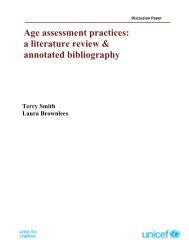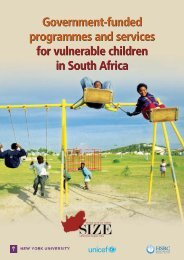Third and Fourth Periodic Report on CRC - Unicef
Third and Fourth Periodic Report on CRC - Unicef
Third and Fourth Periodic Report on CRC - Unicef
Create successful ePaper yourself
Turn your PDF publications into a flip-book with our unique Google optimized e-Paper software.
<str<strong>on</strong>g>Third</str<strong>on</strong>g> <str<strong>on</strong>g>and</str<strong>on</strong>g> <str<strong>on</strong>g>Fourth</str<strong>on</strong>g> <str<strong>on</strong>g>Periodic</str<strong>on</strong>g> <str<strong>on</strong>g>Report</str<strong>on</strong>g><br />
We may add that the above is not meant to be a comprehensive list <str<strong>on</strong>g>and</str<strong>on</strong>g> provides <strong>on</strong>ly some of our percepti<strong>on</strong>s <str<strong>on</strong>g>and</str<strong>on</strong>g><br />
suggesti<strong>on</strong>s. We wish <strong>on</strong>ly to emphasise the importance of giving the deviant child an opportunity to do better <str<strong>on</strong>g>and</str<strong>on</strong>g> rejoin<br />
mainstream social structure. As was stated by the Supreme Court of India in Sheela Barse v. Secretary, Children’s Aid<br />
Society <str<strong>on</strong>g>and</str<strong>on</strong>g> others, 1987 (3) SCC 50, "If there be no proper growth of children of today, the future of the country will be<br />
dark. It is the obligati<strong>on</strong> of every generati<strong>on</strong> to bring up children who will be citizens of tomorrow in a proper way. Today’s<br />
children will be the leaders of tomorrow who will hold the country’s banner high <str<strong>on</strong>g>and</str<strong>on</strong>g> maintain the prestige of the Nati<strong>on</strong>. If a<br />
child goes wr<strong>on</strong>g for want of proper attenti<strong>on</strong>, training <str<strong>on</strong>g>and</str<strong>on</strong>g> guidance, it will indeed be a deficiency of the society <str<strong>on</strong>g>and</str<strong>on</strong>g> of the<br />
government of the day."<br />
BACK TO THE CASE IN HAND:<br />
With the above scheme of criminal trial in view, we find that the Children Act, 1974 deals with the jurisdicti<strong>on</strong> of a Court with<br />
regard, inter alia, to accused pers<strong>on</strong>s under the age of 16 years. The Act is of universal applicati<strong>on</strong> <str<strong>on</strong>g>and</str<strong>on</strong>g> gives the jurisdicti<strong>on</strong><br />
over all such accused pers<strong>on</strong>s to the Juvenile Court set-up under the provisi<strong>on</strong> of the Children Act, 1974. The Act, therefore,<br />
has an overriding character having a universally acceptable approach, inasmuch as it gives the jurisdicti<strong>on</strong> to the Juvenile<br />
Court to try all offences which may c<strong>on</strong>cern any child below the age of 16 years. It is with this view in mind, we believe, that<br />
so many of the decisi<strong>on</strong>s of this Bench have been either sent <strong>on</strong> rem<str<strong>on</strong>g>and</str<strong>on</strong>g> for trial by the Juvenile Court up<strong>on</strong> assessment of<br />
age or judgments have been set aside due to lack of jurisdicti<strong>on</strong> of the Court other than the Juvenile Court trying the accused<br />
children. We are, therefore, of the view, that jurisdicti<strong>on</strong> over the offence is a sec<strong>on</strong>dary c<strong>on</strong>siderati<strong>on</strong>, the first c<strong>on</strong>siderati<strong>on</strong><br />
being the jurisdicti<strong>on</strong> over the pers<strong>on</strong> of the accused. When the jurisdicti<strong>on</strong> over pers<strong>on</strong> is established then no other Court<br />
has power to try a child below the age of 16 years. In such view of the matter, we find that the trial of the accused who was<br />
found to the below the age of 16 years at the framing of charge was without jurisdicti<strong>on</strong>.<br />
The trial having been without jurisdicti<strong>on</strong>, under normal circumstances it would be incumbent up<strong>on</strong> this Court to send the<br />
case back for fresh trial by the appropriate Court, namely the Juvenile Court. It appears from the records of the instant case<br />
that up<strong>on</strong> the finding that the accused was a minor, the Nari-o-Shishu Nirjatan Daman Tribunal assumed the role of Juvenile<br />
Court. We see from the order sheets that the Judge claimed himself to be the Additi<strong>on</strong>al Sessi<strong>on</strong>s Judge thus discarding his<br />
own title of Judge, Nari-o-Shishu Nirjatan Daman Tribunal. However, at the same time, we find that the Judge, while framing<br />
the charge, was the Additi<strong>on</strong>al Sessi<strong>on</strong>s Judge, 1st Court <str<strong>on</strong>g>and</str<strong>on</strong>g> Judge of the Nari-o-Shishu Nirjatan Daman Special Tribunal,<br />
Jhenaidah. This has created a serious anomaly. The Nari-o-Shishu Nirjatan Daman Tribunal cannot be the Juvenile Court.<br />
What is apparent from the judgment is that the death sentence having been awarded, the Court which tried the c<strong>on</strong>demned<br />
pris<strong>on</strong>er, could not have been the Juvenile Court, because the Juvenile Court Judge, under the procedures laid down by the<br />
Children Act, could not have passed a sentence of death. We note from the letter of Reference that the learned Judge has<br />
signed himself as the Additi<strong>on</strong>al Sessi<strong>on</strong>s Judge, 1st Court, Jhenaidah, again discarding his title of Judge, Nari-o-Shishu<br />
Nirjatan Daman Tribunal. In the end we are left with the feeling that the learned Judge did not know exactly what role he<br />
was playing, whether it was as the Judge of the Nari-o-Shishu Nirjatan Daman Tribunal or the Juvenile Court. Clearly he did<br />
not exercise his judicial mind. Be that as it may, we would be inclined to send the case <strong>on</strong> rem<str<strong>on</strong>g>and</str<strong>on</strong>g> for fresh trial before a<br />
Juvenile Court. However, <strong>on</strong> the evidence <str<strong>on</strong>g>and</str<strong>on</strong>g> materials <strong>on</strong> record we find that the decisi<strong>on</strong> is based <strong>on</strong> the c<strong>on</strong>fessi<strong>on</strong> of<br />
the accused <str<strong>on</strong>g>and</str<strong>on</strong>g> circumstantial evidence, it being admitted that there is no eyewitness of the occurrence. On careful scrutiny<br />
of all the evidence <str<strong>on</strong>g>and</str<strong>on</strong>g> materials <strong>on</strong> record we do not find any circumstantial evidence to c<strong>on</strong>nect the accused with the<br />
offence. As we have stated earlier, the learned D.A.G. c<str<strong>on</strong>g>and</str<strong>on</strong>g>idly <str<strong>on</strong>g>and</str<strong>on</strong>g> correctly c<strong>on</strong>ceded that the c<strong>on</strong>fessi<strong>on</strong>al statement could<br />
not be said to be voluntary since it was recorded three days after the accused was arrested <str<strong>on</strong>g>and</str<strong>on</strong>g> certainly after illegal<br />
detenti<strong>on</strong> in police custody. We note from the evidence of the witnesses that the accused was apprehended <str<strong>on</strong>g>and</str<strong>on</strong>g> h<str<strong>on</strong>g>and</str<strong>on</strong>g>ed<br />
over to the police by <strong>on</strong>e Kamal, who was not examined as a witness in the case. We also note that the witnesses, including<br />
the victim’s father, stated in their evidence that the accused had been tortured by the police before he c<strong>on</strong>fessed <str<strong>on</strong>g>and</str<strong>on</strong>g> that<br />
in his cross-examinati<strong>on</strong> the victim’s father stated that neither he nor any<strong>on</strong>e in his family suspected this accused <str<strong>on</strong>g>and</str<strong>on</strong>g> that<br />
so far as he was aware, the accused was not c<strong>on</strong>nected with the murder of his daughter <str<strong>on</strong>g>and</str<strong>on</strong>g> that he had no complaint<br />
against the accused. We feel that sending the case back for trial before the Juvenile Court would not unearth any further<br />
160
















